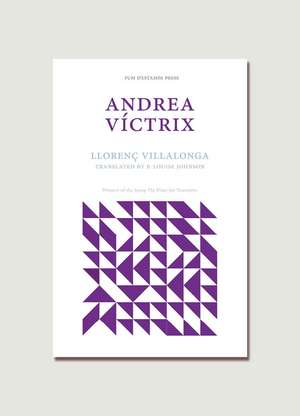Andrea Víctrix
Autor Llorenç Villalonga Traducere de P Louise Johnsonen Limba Engleză Paperback – 14 apr 2021
Part socio-political essay, part dystopian fiction, Andrea Víctrix presents a shockingly prescient vision of Palma, Mallorca in 2050. In comparing the anonymous narrator’s ‘traditional’ 1960s values with a future society that has done away with family and gender, Villalonga sets up an intriguing interplay between the narrator and the androgynous Andrea Víctrix, so-called Director of Pleasure, in a powerfully satirical, sometimes ironic exploration of contemporary issues such as gender and sexuality, consumerism, environmental disaster and the politics of big business.
Preț: 95.82 lei
Nou
Puncte Express: 144
Preț estimativ în valută:
18.33€ • 19.14$ • 15.17£
18.33€ • 19.14$ • 15.17£
Carte disponibilă
Livrare economică 14-28 martie
Livrare express 28 februarie-06 martie pentru 24.64 lei
Preluare comenzi: 021 569.72.76
Specificații
ISBN-13: 9781916293946
ISBN-10: 1916293948
Pagini: 304
Dimensiuni: 130 x 197 x 25 mm
Greutate: 0.36 kg
Editura: FUM D'ESTAMPA PRESS
Colecția Fum d'Estampa Press
ISBN-10: 1916293948
Pagini: 304
Dimensiuni: 130 x 197 x 25 mm
Greutate: 0.36 kg
Editura: FUM D'ESTAMPA PRESS
Colecția Fum d'Estampa Press
Notă biografică
Llorenç Villalonga (Palma de Mallorca, 1897-1980) was an important exponent of Majorcan narrative in the 20th century. Coming from a family of rural landowners, he studied medicine and began to publish articles in 1924. His first novel, Mort de dama (1931), courted controversy, though Bearn o la sala de les nines (1956 Spanish, 1961 Catalan) is perhaps his best-known work. Andrea Víctrix is considered to be his most ambitious novel. He died at home after a long illness.
P. Louise Johnson (Matlock, 1970) has been at the University of Sheffield since 1996. She discovered Llorenç Villalonga while an undergraduate at St John’s College, Oxford, and subsequently wrote her doctorate on his work. In 2002 her monograph La tafanera posteritat: assaigs sobre Llorenç Villalonga was awarded the first Premi Casa Museu-Llorenç Villalonga. Louise has published widely on Villalonga, and taught Andrea Víctrix (1974) to a generation of students who have been variably receptive to this camp, dystopian vision of Mallorca, and satire on mid-twentieth-century politics and social mores.
P. Louise Johnson (Matlock, 1970) has been at the University of Sheffield since 1996. She discovered Llorenç Villalonga while an undergraduate at St John’s College, Oxford, and subsequently wrote her doctorate on his work. In 2002 her monograph La tafanera posteritat: assaigs sobre Llorenç Villalonga was awarded the first Premi Casa Museu-Llorenç Villalonga. Louise has published widely on Villalonga, and taught Andrea Víctrix (1974) to a generation of students who have been variably receptive to this camp, dystopian vision of Mallorca, and satire on mid-twentieth-century politics and social mores.
Recenzii
“With the novel Andrea Víctrix, Llorenç Villalonga’s amalgamation is a spasmotic, incredible story, accumulative and grotesque, truly original, unique and highly relevant in its own literary context.”—Andrea Navarra, The Barcelona Review
“A truly great novel, beautiful and terrifying in equal parts, tender and groundbreaking, and one that should be read for many years to come. A warning from history.”—Jordi Llavina, El 3 de Vuit
"This is another excellent novel from still relatively new publisher Fum d’Estampa. I had read quite a few Catalan novels before they were formed but I am clearly going to discover quite a few more interesting ones . . . [This is] a superb story with a host of fascinating ideas—my idea of a good novel."—The Modern Novel
“A truly great novel, beautiful and terrifying in equal parts, tender and groundbreaking, and one that should be read for many years to come. A warning from history.”—Jordi Llavina, El 3 de Vuit
"This is another excellent novel from still relatively new publisher Fum d’Estampa. I had read quite a few Catalan novels before they were formed but I am clearly going to discover quite a few more interesting ones . . . [This is] a superb story with a host of fascinating ideas—my idea of a good novel."—The Modern Novel
